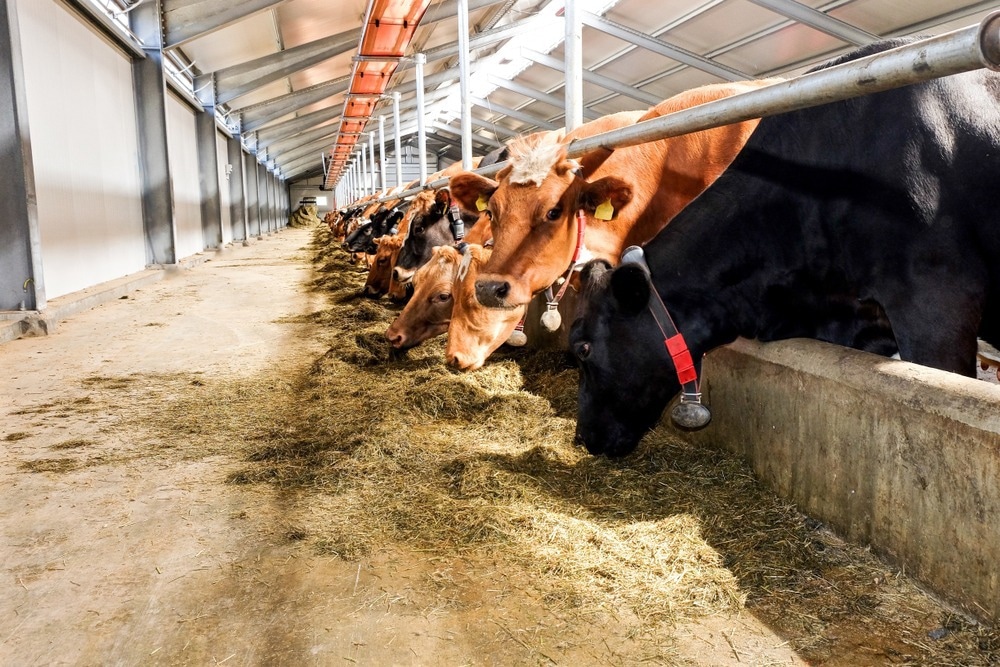Reviewed by Emily Henderson, B.Sc.Nov 3 2022
A new study has shown that ramped-up animal agriculture would help increase efficiency. However, a potential rise in animal-borne diseases is the risk of future pandemics.

Image Credit: VipadaLoveYou/Shutterstock.com
As climate change endangers global food supplies, countries will require to increase the efficiency of food production, bringing about short-term gains, such as decreased deforestation, but long-lasting risks.
This includes future pandemics halting from animal-borne diseases, which is determined in a new study published in the Science Advances journal.
The majority of agriculture's current and expected “intensification” focuses on growing meat production via highly efficient methods. This includes factory farming, thereby retaining animals in closely restricted surroundings and increasing the risk of the spread of zoonotic diseases, like avian influenza.
As long as meat consumption continues to rise globally, both climate change, from deforestation and methane, and pandemics will likely continue to rise.
Matthew Hayek, Study Author, and Assistant Professor, Department of Environmental Studies, New York University
Hayek reviews over 100 articles learning the effects of deepening animal agriculture on the surrounding and on zoonotic diseases—infectious diseases that originate from animals.
Since the climate warms, scientists have concluded that countries will be required to produce more food, and in a more efficient manner, compared to ever before. To fulfill such present and future requirements, the agriculture industry has approved “intensification” practices: adding more “inputs,” like hormones, machinery, and antibiotics, while the production increases.
Hayek’s Science Advances analysis exhibits that intensification can, in the short run, decrease animal feed needs and land use since animals are gaining weight as fast as possible and are sedentary while being positioned in intensive facilities—instead of grazing on open land.
This could help decrease deforestation, thereby helping to retain wild animal habitats and buffering opposing diseases from those wild animals by holding them far from normal human contact.
But intensification could expedite diseases coming from animals that are domestically farmed.
This is because intensive production facilities confine animals close to each other. This confinement, most typically used for pigs and chickens, allows diseases to quickly spread and mutate rapidly among thousands of animals in one facility.
Matthew Hayek, Study Author, and Assistant Professor, Department of Environmental Studies, New York University
More accurately, the Science Advances examination disclosed that increasing chickens need three times more antibiotics and 170 times more animals to create the same quantity of meat as raising cattle. This helps increase hazards of diseases like avian influenza (“bird flu”) and antibiotic-resistant bacteria.
Hence, shifting meat consumption from beef to chicken could help benefit the climate. Hayek stated that it could rush the spread of expensive and possibly pandemic diseases.
Meat consumption creates a ‘trap’ of disease risks: extensive ‘free-range’ production that requires wildlife habitat clearing on one hand or intensive animal confinement on the other.
Matthew Hayek, Study Author, and Assistant Professor, Department of Environmental Studies, New York University
Hayek added, “To prevent both climate change and costly pandemics in tandem, we should rapidly reduce meat consumption as well as support forest protections and better-farmed animal health through veterinary services. Policies can help accelerate the shift to plant-rich options by changing our food landscape: making plant-based choices easier to access, more affordable, and more appealing.”
Journal Reference:
Hayek, M. N., et al. (2022) The infectious disease trap of animal agriculture. Science Advances. https://doi.org/10.1126/sciadv.add6681.